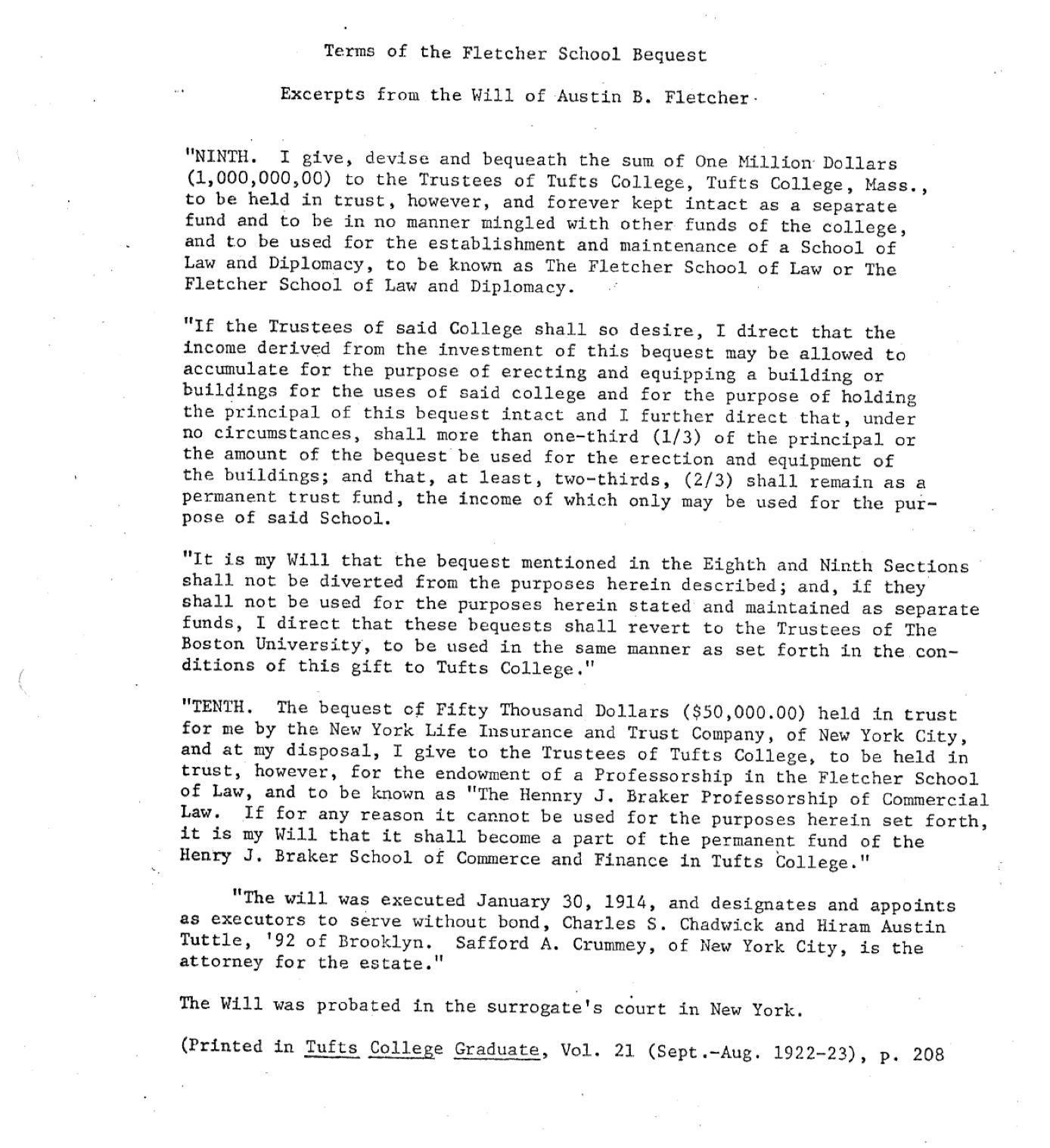|
Feinstein International Center
The Feinstein International Center (FIC) is a research and teaching center based at the Friedman School of Nutrition Science and Policy at Tufts University. The Center promotes the use of evidence and learning in operational and policy responses to protect and strengthen the lives, livelihoods, and dignity of people affected by humanitarian crises. History and profile The center was founded in 1997 as the Feinstein International Famine Center with an endowment from Alan Shawn Feinstein. The Center was originally set up as a tribute to the victims of the Irish famine (1840–1846) on its 150th anniversary. It was established as one of two centers of learning on famine, one at the Friedman School in Boston, US, a city that has a large Irish immigrant population, and one at Cork University in Ireland. In 2006, the Center was renamed the Feinstein International Center (FIC). Today, FIC has a research and teaching agenda that includes nutrition, food security, livelihoods, refugee ... [...More Info...] [...Related Items...] OR: [Wikipedia] [Google] [Baidu] |
Non-profit Organization
A nonprofit organization (NPO) or non-profit organisation, also known as a non-business entity, not-for-profit organization, or nonprofit institution, is a legal entity organized and operated for a collective, public or social benefit, in contrast with an entity that operates as a business aiming to generate a profit for its owners. A nonprofit is subject to the non-distribution constraint: any revenues that exceed expenses must be committed to the organization's purpose, not taken by private parties. An array of organizations are nonprofit, including some political organizations, schools, business associations, churches, social clubs, and consumer cooperatives. Nonprofit entities may seek approval from governments to be tax-exempt, and some may also qualify to receive tax-deductible contributions, but an entity may incorporate as a nonprofit entity without securing tax-exempt status. Key aspects of nonprofits are accountability, trustworthiness, honesty, and openness to eve ... [...More Info...] [...Related Items...] OR: [Wikipedia] [Google] [Baidu] |
Children's Rights
Children's rights are a subset of human rights with particular attention to the rights of special protection and care afforded to minors."Children's Rights" , Amnesty International. Retrieved 2/23/08. The 1989 (CRC) defines a child as "any human being below the age of eighteen years, unless under the law applicable to the child, is attained earlier." [...More Info...] [...Related Items...] OR: [Wikipedia] [Google] [Baidu] |
Fletcher School Of Law And Diplomacy
The Fletcher School of Law and Diplomacy is the graduate school of international affairs of Tufts University, in Medford, Massachusetts. The School is one of America's oldest graduate schools of international relations and is well-ranked in its masters and doctoral programs. As of 2017, the student body numbered around 230, of whom 36 percent were international students from 70 countries, and around a quarter were U.S. minorities. The school's alumni network numbers over 9,500 in 160 countries, and includes ambassadors, diplomats, foreign ministers, high-ranking military officers, heads of nonprofit organizations, and corporate executives. History The Fletcher School of Law and Diplomacy was founded in 1933 with the bequest of Austin Barclay Fletcher, who left over $3 million to Tufts University upon his death in 1923. A third of these funds were dedicated “for the establishment and maintenance of a School of Law and Diplomacy, to be known as The Fletcher School of Law or T ... [...More Info...] [...Related Items...] OR: [Wikipedia] [Google] [Baidu] |
ReliefWeb
ReliefWeb is a humanitarian information portal founded in 1996. The portal now hosts more than 720,000 humanitarian situation reports, press releases, evaluations, guidelines, assessments, maps and infographics. The portal is an independent vehicle of information, designed specifically to assist the international humanitarian community in effective delivery of emergency assistance or ''relief''. It provides information as humanitarian crises unfold, while emphasizing the coverage of "forgotten emergencies" at the same time. Origin and development ReliefWeb was founded in October 1996 and is administered by the United Nations Office for the Coordination of Humanitarian Affairs (OCHA). The project began under the US Department of State, Bureau of International Organization Affairs, which had noticed during the Rwanda crisis how poorly critical operational information was shared between NGOs, UN Agencies and Governments. In 1995, the Department's Senior Policy Adviser on Disas ... [...More Info...] [...Related Items...] OR: [Wikipedia] [Google] [Baidu] |
Livelihood
A person's livelihood (derived from ''life-lode'', "way of life"; cf. OG ''lib-leit'') refers to their "means of securing the basic necessities (food, water, shelter and clothing) of life". Livelihood is defined as a set of activities essential to everyday life that are conducted over one's life span. Such activities could include securing water, food, fodder, medicine, shelter, clothing. An individual's livelihood involves the capacity to acquire aforementioned necessities in order to satisfy the basic needs of themselves and their household. The activities are usually carried out repeatedly and in a manner that is sustainable and providing of dignity. For instance, a fisherman's livelihood depends on the availability and accessibility of fish. The concept of Sustainable Livelihood (SL) is an attempt to go beyond the conventional definitions and approaches to poverty eradication. These had been found to be too narrow because they focused only on certain aspects or manifestation ... [...More Info...] [...Related Items...] OR: [Wikipedia] [Google] [Baidu] |
Evidence-based Practice
Evidence-based practice (EBP) is the idea that occupational practices ought to be based on scientific evidence. While seemingly obviously desirable, the proposal has been controversial, with some arguing that results may not specialize to individuals as well as traditional practices. Evidence-based practices have been gaining ground since the formal introduction of evidence-based medicine in 1992 and have spread to the allied health professions, education, management, law, public policy, architecture, and other fields. In light of studies showing problems in scientific research (such as the replication crisis), there is also a movement to apply evidence-based practices in scientific research itself. Research into the evidence-based practice of science is called metascience. The movement towards evidence-based practices attempts to encourage and, in some instances, require professionals and other decision-makers to pay more attention to evidence to inform their decision-making. ... [...More Info...] [...Related Items...] OR: [Wikipedia] [Google] [Baidu] |
Forced Migration
Forced displacement (also forced migration) is an involuntary or coerced movement of a person or people away from their home or home region. The UNHCR defines 'forced displacement' as follows: displaced "as a result of persecution, conflict, generalized violence or human rights violations". A forcibly displaced person may also be referred to as a "forced migrant", a "displaced person" (DP), or, if displaced within the home country, an "internally displaced person" (IDP). While some displaced persons may be considered as refugees, the latter term specifically refers to such displaced persons who are receiving legally-defined protection and are recognized as such by their country of residence and/or international organizations. Forced displacement has gained attention in international discussions and policy making since the European migrant crisis. This has since resulted in a greater consideration of the impacts of forced migration on affected regions outside Europe. Various i ... [...More Info...] [...Related Items...] OR: [Wikipedia] [Google] [Baidu] |
Nutrition
Nutrition is the biochemical and physiological process by which an organism uses food to support its life. It provides organisms with nutrients, which can be metabolized to create energy and chemical structures. Failure to obtain sufficient nutrients causes malnutrition. Nutritional science is the study of nutrition, though it typically emphasizes human nutrition. The type of organism determines what nutrients it needs and how it obtains them. Organisms obtain nutrients by consuming organic matter, consuming inorganic matter, absorbing light, or some combination of these. Some can produce nutrients internally by consuming basic elements, while some must consume other organisms to obtain preexisting nutrients. All forms of life require carbon, energy, and water as well as various other molecules. Animals require complex nutrients such as carbohydrates, lipids, and proteins, obtaining them by consuming other organisms. Humans have developed agriculture and cooking to replace for ... [...More Info...] [...Related Items...] OR: [Wikipedia] [Google] [Baidu] |
Famine
A famine is a widespread scarcity of food, caused by several factors including war, natural disasters, crop failure, Demographic trap, population imbalance, widespread poverty, an Financial crisis, economic catastrophe or government policies. This phenomenon is usually accompanied or followed by regional malnutrition, starvation, epidemic, and increased death, mortality. Every inhabited continent in the world has experienced a period of famine throughout history. In the 19th and 20th century, generally characterized Southeast and South Asia, as well as Eastern and Central Europe, in terms of having suffered most number of deaths from famine. The numbers dying from famine began to fall sharply from the 2000s. Since 2010, Africa has been the most affected continent of famine in the world. Definitions According to the United Nations World Food Programme, famine is declared when malnutrition is widespread, and when people have started dying of starvation through lack of access to suf ... [...More Info...] [...Related Items...] OR: [Wikipedia] [Google] [Baidu] |
Food Security
Food security speaks to the availability of food in a country (or geography) and the ability of individuals within that country (geography) to access, afford, and source adequate foodstuffs. According to the United Nations' Committee on World Food Security, food security is defined as meaning that all people, at all times, have physical, social, and economic access to sufficient, safe, and nutritious food that meets their food preferences and dietary needs for an active and healthy life. The availability of food irrespective of class, gender or region is another element of food security. There is evidence of food security being a concern many thousands of years ago, with central authorities in ancient China and ancient Egypt being known to release food from storage in times of famine. At the 1974 World Food Conference, the term "food security" was defined with an emphasis on supply; food security is defined as the "availability at all times of adequate, nourishing, diverse, bal ... [...More Info...] [...Related Items...] OR: [Wikipedia] [Google] [Baidu] |
Vulnerability
Vulnerability refers to "the quality or state of being exposed to the possibility of being attacked or harmed, either physically or emotionally." A window of vulnerability (WOV) is a time frame within which defensive measures are diminished, compromised, or lacking. The understanding of social and environmental vulnerability, as a methodological approach, involves the analysis of the risks and assets of disadvantaged groups, such as the elderly. The approach of vulnerability in itself brings great expectations of social policy and gerontological planning. Types of vulnerability include social, cognitive, environmental, emotional or military. In relation to hazards and disasters, vulnerability is a concept that links the relationship that people have with their natural environment, environment to social forces and institutions and the cultural values that sustain and contest them. “The concept of vulnerability expresses the multi-dimensionality of disasters by focusing attentio ... [...More Info...] [...Related Items...] OR: [Wikipedia] [Google] [Baidu] |
Poverty
Poverty is the state of having few material possessions or little income. Poverty can have diverse social, economic, and political causes and effects. When evaluating poverty in statistics or economics there are two main measures: ''absolute poverty'' compares income against the amount needed to meet basic needs, basic personal needs, such as food, clothing, and Shelter (building), shelter; ''relative poverty'' measures when a person cannot meet a minimum level of living standards, compared to others in the same time and place. The definition of ''relative poverty'' varies from one country to another, or from one society to another. Statistically, , most of the world's population live in poverty: in Purchasing Power Parity, PPP dollars, 85% of people live on less than $30 per day, two-thirds live on less than $10 per day, and 10% live on less than $1.90 per day ... [...More Info...] [...Related Items...] OR: [Wikipedia] [Google] [Baidu] |





.jpg)
